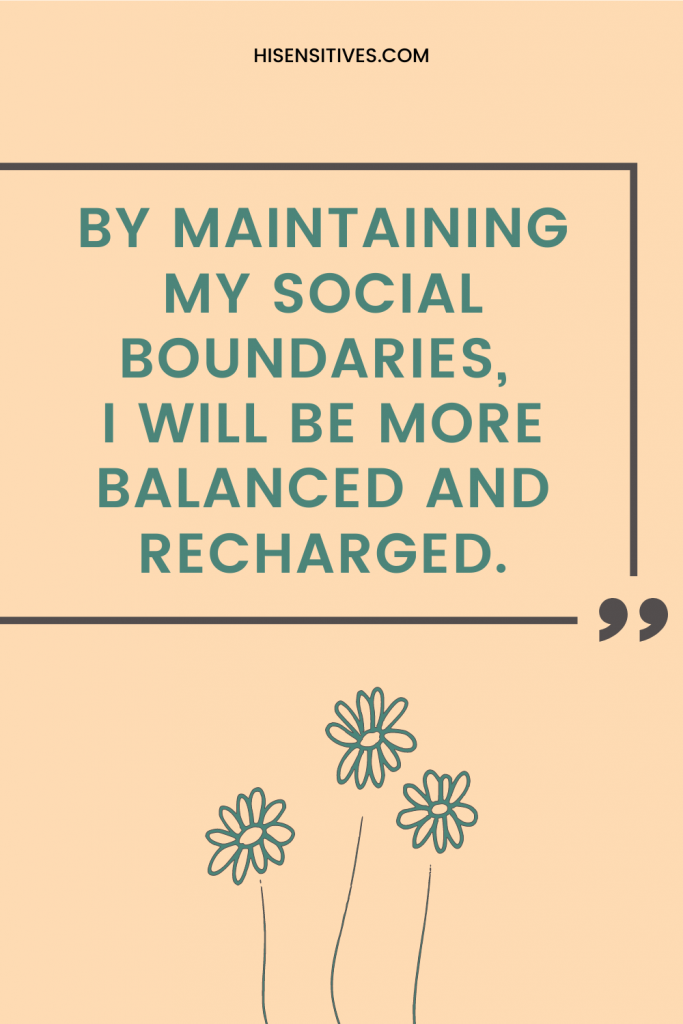Socializing too much can cause a real ‘introvert burnout’. In this article, you will learn how to set healthy social boundaries as an introvert.
Estimated reading time: 15 minutes
In a society where extroverted qualities are promoted as ‘the norm’, it can be challenging for introverts. I cannot count the times where I tried to fit in. Where I leaned myself too far out of my comfort zone and ended up feeling burned out. Also well-known as the ‘introvert burnout’.
Throughout the years, I discovered I am not the only introvert struggling with this issue. Many of us feel burned out from socializing too often. As a result, our socializing energy drains and we feel incredibly exhausted and worn out.
In my search for a solution to this challenge, I have come across incredibly useful tips which I will share with you in this article. These tips will help you to learn how to set healthy social boundaries as an introvert.
Here’s What You’ll Learn:
- What Is An Introvert?
- 3 Common Socializing Challenges For Introverts
- Why Do Introverts Struggle With Socializing Too Often?
- 7 Tips To Set Social Boundaries When You Are An Introvert
- 1. Identify Your Current Situation And Ideal Future
- 2. Set Personal Socializing Limits
- 3. Communicate Your Boundaries With Your Friends & Family
- 4. Examine Your Current Relationships
- 5. Schedule Time For Self-Love & Self Care
- 6. Limit Your Availability On Social Media & Texting
- 7. Create Social Boundaries Affirmations
- Good Luck With Setting Social Boundaries As An Introvert!
What Is An Introvert?
Before we deep dive into setting social boundaries as an introvert, let’s have a look at the definition of being introverted.
Extroversion and introversion were introduced in psychology by psychiatrist Carl Jung. Extroverts are outgoing, talkative and enjoy socializing. Moreover, extroverts thrive off being in the company and energy of other people.
Introversion entails being more interested in one’s own mental self. Also, introverts oftentimes are more reserved and reflective. As a result, introverts enjoy solitary activities like meditation, reading books and creating art (while being alone). It helps them to recharge their mental and physical energy.
Besides extroversion and introversion, there also are ambiverts. Ambiverts could be described as ‘outgoing introverts’. In the company of the right people, they open up and become more outgoing. However, they still carry many typical characteristics of introverts.
If you’d like to read more about introverts, you may want to read the bestseller ‘Quiet: The Power of Introverts in a World That Can’t Stop Talking’.
3 Common Socializing Challenges For Introverts
When you are an introvert or ambivert, you may face certain struggles when it comes to setting social boundaries. Below, I summarized the three biggest challenges.
1. Feeling Pushed To Change
The first and biggest challenge for introverts is the feeling that they have to change. As they make up about one third of the world population, they are a minority that often is misunderstood.
As mentioned, our society seems to appreciate extroversion more than introversion. Consequently, introverts (subconsciously) feel that they are not good enough and have to change.
In addition, their social surroundings oftentimes push them as well. Many introverts have heard phrases such as ‘Just put yourself out there a little more’ or ‘Don’t be so shy’. As a result, this puts a great amount of pressure on the introvert.
In worst case, this may result in low self-esteem and social anxiety. Therefore, this is one of the biggest challenges that introverts (and ambiverts) have to overcome in relation to setting healthy social boundaries.
2. Over-scheduling
Another common social challenge for introverts (and especially ambiverts) is over-scheduling. Due to our need to fit the expectations of society and to please our social connections, we often over-schedule.
I cannot count the times where I made plans in an extroverted moment and regretted it once that moment had passed. This often results in me feeling the need to recharge my ‘social energy tank’ but not being able to do so because of the social obligations I committed myself to attend.
A packed agenda may cause great stress for introverted people. Seeing all the social obligations in our schedule without having enough time to ourselves may result in great exhaustion.
Can you relate to that? Oftentimes, we want to please our environment. We don’t want to come across as a bad friend, daughter or co-worker. Therefore push past our own boundaries and make social plans in order to please others.
However, it is important to be aware of not over-scheduling too often. Before you know it, you may find yourself feeling burned out and unhappy. Therefore, this is another important challenge to keep in mind and to work on when you start setting social boundaries as an introvert.

3. Social Media Expectations
Finally, one of the biggest social challenges for introverts is social media and instant text messaging. In the past, before technology was so prominent in our society, introverts lived easier lives.
We could ‘isolate’ ourselves and thereby recharge more easily. However, with the uprising of social media and instant text messaging, this has become a great challenge for introverts.
Nowadays, we are always online and available. Hence, people continuously ‘invade’ our personal space and peaceful moments. Extroverts love doing this! We get it, their needs are different than ours and we respect that. However, those of us who are introverted may never truly experience a feeling of peace and serenity due to always being available.
This ’24/7 available’-mentality can break an introvert. It disables them to take a break from socializing and makes them feel restless. In worst case, you may even start to feel annoyed when receiving messages (although the sender means well and has no bad intention at all!).
Hence, it is incredibly important to set healthy social boundaries as an introvert using this technology.
Why Do Introverts Struggle With Socializing Too Often?
Now that we examined some of the common socializing challenges for introverts, you may wonder why we face these challenges.
As mentioned, introverts are in the minority. Hence, it is normal that society expects all of us to act outgoing and be talkative like extroverts. However, this expectation is a tough one for introverts.
Because we as introverts are more interested in our own mental self, we thrive when we act more reserved. In social gatherings, we enjoy listening to what others are saying and process it in our minds.
Moreover, we reflect about the input on a deep level, which results in us being less talkative than extroverts. Processing information requires a reserved, quiet and open-minded attitude. Something that comes natural to introverts.
However, being in big social gatherings, can cause great overwhelm within introverted people. As we are processing everything going on around us, big groups of people can cause an introvert to feel drained socially within no time. Generally speaking, introverts thrive more in the presence of small groups of people for a short time period.
When the introvert returns home, the processing of the external input continues. Introverts may reflect on the new information for days, causing them to go into a deep state of introversion.
If we do not give ourselves the time to process mental input and plan many social gatherings in a short period of time, we may cause our physical and mental health great harm. Therefore, this emphasizes the importance to set healthy social boundaries as an introvert.
7 Tips To Set Social Boundaries When You Are An Introvert
This brings us to the most important aspect of this article. How can you as an introvert learn how to set healthy social boundaries? How do you prevent introvert burnout?
I took a deep dive into some of the best techniques and summarized them for you below:
1. Identify Your Current Situation And Ideal Future
The first step in learning how to set healthy social boundaries as an introvert, is to understand how your current situation makes you feel. For that, you need to examine it closer.
Rate your current socializing situation on a scale from 1 to 100, where 100 is the ultimate happiness level and 1 means that you are not happy at all. Then, reflect about which aspects of your current situation make you happy and which don’t. Make a bullet list of all your social interactions and rate them one by one.
For instance, you may discover that you are visiting many big gatherings lately and that this is causing great energy loss for you. Or you may identify that you schedule too many appointments after each other with no time to recharge.
Identifying your current situation will help you to understand why you feel the way you feel. Once you have done that, you start to envision your ideal future.
Perhaps, you may want to meditate while doing this part of the task. Sit down in a calm space and envision your ideal future in relation to social boundaries. Imagine how you want to feel in your daily life and during social gatherings. Let go of all expectations from the outside and focus on what YOU desire.
Once you are done meditating, write down all the ideas that popped up in your mind. After doing so, try to take this a step further with method 2 on this list.
2. Set Personal Socializing Limits
Now that you are aware of your current and ideal situation when it comes to socializing, it is time to start setting social boundaries. You can do so by determining for yourself, what your new standard is:
- How often do you want to hang out with friends during a week?
- What friends and people do you want to hang out with and how often with each of them?
- How many leisure hours a week would you like to spend by yourself?
- How many times a day would you like to read and answer text messages and check social media?
- What type of social gatherings do you enjoy and which ones do you accept because others expect you to? How can you please others in their needs while still maintaining your own boundaries?
For me, answering these questions provided me with a clear blueprint on what I can handle socially. Also, this blueprint helps me to protect my own leisure time that I want to spend by myself to recharge.
By setting personal social boundaries, you will be able to say no to social obligations that do not align with your wellbeing.
3. Communicate Your Boundaries With Your Friends & Family
After determining your own social boundaries as an introvert, it is time to practice them in real life. However, you may face obstacles while doing so.
Usually, people struggle with change. Therefore, your choice to set social boundaries to protect your introvert time, may raise questions within your social circle.
Oftentimes, people tend to take it personally when somebody sets a boundary. Therefore, it is important for you to communicate your new social boundaries in a loving way.
Try to communicate why it is important for you to set these social boundaries as an introvert. Also, tell your friends and family how you believe that it will benefit your own well-being and your relationships with them.
Oftentimes, we are more pleasant to be around when we take well care of our own needs first. Usually, we will be better listeners and carry a more calm and balanced energy. An energy, that other people usually enjoy being around.
When communicating your boundaries with your social circle, make sure to clarify that. Also, validate that your choice to make this change has nothing to do with them and their behavior.
However, if there are people in your surroundings that struggle badly with your new social boundaries, you should have a close look at the next step.
4. Examine Your Current Relationships
Oftentimes, we do not reflect on what the presence of other people does to our wellbeing. All of us sooner or later have people in our lives that aren’t ideal for us and our inner peace. These people often trigger certain negative reactions within us. This could trigger traumas from the past or certain negative characteristics within us.
These connections can be true social energy leaks. Being around people that do not align with your values and character, can cause you to feel great mental and physical overwhelm. Therefore, it is important to examine your current relationships.
Have a clear look at every person you surround yourself with regularly and ask yourself these questions:
- How does the energy in this relationship flow? Is there an equal exchange of energy and love?
- What do I enjoy about their company?
- How does this relationship contribute to their life and mine?
- How does this person make me feel about myself?
After answering these question for every person in your life, you will have a clear picture of who you enjoy surrounding yourself with and who you rather wouldn’t see that often anymore or maybe even disconnect from.
By consciously examining your relationships, you will know which social boundaries you should set for which people. Perhaps there are some people you like to see more often than others. If that is the case, that is perfectly fine. Do not feel guilty about who you choose to spend your leisure time with and how often.
If you need more help with deep diving into and maintaining your relationships, you may want to read the book ‘Connect: Building Exceptional Relationships with Family, Friends, and Colleagues’.
5. Schedule Time For Self-Love & Self Care
When you set social boundaries as an introvert, the most important aspect is to not forget yourself. Therefore, try to schedule enough time for yourself every day. Use this time for activities that provoke a feeling of self-love within you.
Choose self care activities that make you feel better about yourself. That help you to recharge your energy. Activities that you deeply enjoy doing. Self care is not selfish, remember that.
In order to be able to socialize as an introvert, this aspect is crucial! After all, you cannot pour from an empty cup. Especially if you also are highly sensitive and/or an empath, you will need to focus a great amount of your time on self-love and self care.
This way, you ensure to balance your energy and meet your social circle with a calm and relaxed mind.
If you’d like to learn more about self-love and self care, you may want to have a look at ‘The Self-Love Workbook: A Life-Changing Guide to Boost Self-Esteem, Recognize Your Worth and Find Genuine Happiness’.
6. Limit Your Availability On Social Media & Texting
The ’24/7 available’-mentality can be a real energy leak for introverts. Therefore, you should be conscious about your phone usage.
For instance, I turned off all social media- and instant messaging notifications on my phone. I do not see when I receive a new message.
My closest connections know that they have to send an old fashioned SMS when it is urgent. And when it is really urgent, they know that they can call me anytime. My notifications for these two communication methods are turned on, so that I will see them once I check my phone.
By setting this social boundary, I took back control over when I want to be social with others and when I want to spend time ‘in my mind’.
Does that mean that I neglect my friends? No! I simply choose one moment during the day where I open other apps to answer personal messages. 99% of the time, the messages are not urgent, so it is totally fine to do things this way.
Back in the old days, it was completely normal to ‘only’ connect once or twice every month, so why shouldn’t it be okay to respond to non-urgent messages once a day? When you make sure to see your friends on a regular basis to deeply connect with them, this social boundary should not be a problem at all.
However, keep in mind to communicate this change in your social media- and texting behavior with your social circle, as they still might be used to the old ’24/7 available’-you.
If you’d like to read more about social media and its effect on your happiness, have a look at the book ‘Logged In and Stressed Out: How Social Media is Affecting Your Mental Health and What You Can Do About It’.
7. Create Social Boundaries Affirmations
After reading all of the methods above, you may feel motivated, but also worried about not managing to maintain these healthy social boundaries. I get it, it is scary to choose for your own wellbeing.
However, there are certain ways to improve your mindset regarding setting social boundaries as an introvert. One of the methods you could try, is to create your own social boundaries affirmations.
For instance, you may want to use these affirmations:

By maintaining my social boundaries, I will be more balanced and recharged.
I am choosing inner peace by protecting my time carefully.
I deserve to put myself first, before giving to others.
It is okay to spend time by myself without explaining to others why I choose to do so.
I honor the balance of giving and taking in relationships. I am choosing for myself today.
My boundaries serve me and others and are non-negotiable.
I am worthy and I deserve to set and maintain my social boundaries.
It is safe for me to lovingly communicate my boundaries with others.
I respect myself by respecting my social boundaries.
My social boundaries help me to truly thrive in life through balance, happiness and inner peace.
Whenever you realize that you struggle with setting a boundary, repeat your affirmations to yourself. They will empower you to put yourself first in order to create more balance and inner peace in your life.
Good Luck With Setting Social Boundaries As An Introvert!
After receiving these tips, I hope that you feel ready and safe to start setting healthy social boundaries. As an introvert, you deserve to protect your own time and wellbeing.
Hopefully, these tips will help you to love and respect yourself more and to be more conscious about how to spend your leisure time.
If you’d like to read more about setting healthy boundaries, you may enjoy the popular book ‘Set Boundaries, Find Peace: A Guide to Reclaiming Yourself’.






